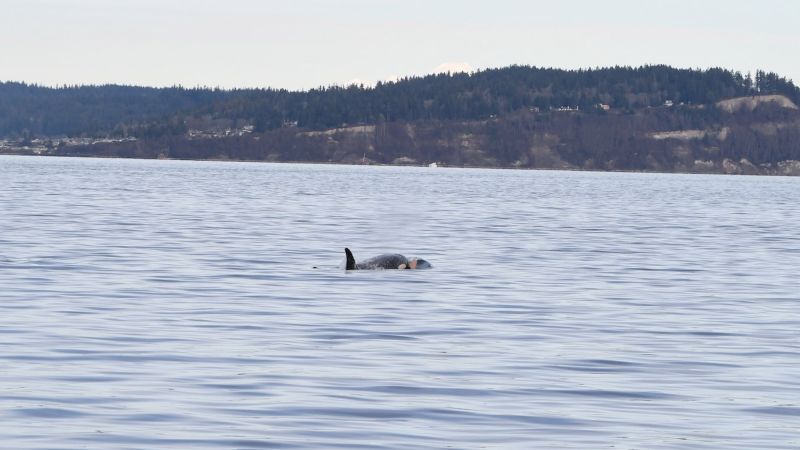In recent news, the tragic story of Tahlequah, an orca known scientifically as J35, has resurfaced, reigniting the compassion of animal lovers worldwide. This heartfelt narrative began in 2018 when Tahlequah drew global attention for her incredible act of mourning. She carried her deceased calf for an astonishing 17 days and traversed over 1,000 miles (approximately 1,600 kilometers). Now, the orca is once again reflecting profound grief as she exhibits similar behavior following the loss of her new calf, J61, a female calf first seen on December 20, in the scenic Puget Sound area located in Washington State.
The first public sighting of calf J61 was confirmed by the National Oceanic and Atmospheric Administration (NOAA) on December 23. Unfortunately, by New Year’s Eve, a devastating update came through: the calf had been confirmed deceased. Dr. Michael Weiss, a research director at the Center for Whale Research, conveyed this sorrowful news, shedding light on the fragility of life for these magnificent creatures. As of January 5, researchers reported that Tahlequah continues to carry the body of her calf, a heartbreaking situation elaborated on by Dr. Brad Hanson, a wildlife biologist with the NOAA’s Northwest Fisheries Science Center.
Despite the ongoing mourning, researchers are predicting that updates on Tahlequah’s status may become limited as her pod moves away from their usual habitat in the Puget Sound. Current observations reveal that she is using her snout to nudge her deceased calf’s body, which weighs an impressive 300 pounds (136 kilograms), ensuring it remains close to her. This display of maternal attachment highlights the powerful bond that exists between orca mothers and their calves, characterized as one of the strongest social relationships found in the animal kingdom. Dr. Weiss notes in his observations that Tahlequah’s attachment indicates she is far from ready to let go of her lost offspring.
The emotional toll of this loss extends beyond Tahlequah as it poses grave concerns for the already endangered population of Southern Resident orcas. Reports indicate that this population has dwindled to a mere 73 individuals, a stark status that labels them as one of the most critically endangered marine mammal populations in the United States. The collective grief expressed by Tahlequah raises alarms regarding the impact it may have on her health and ability to thrive within such a vulnerable demographic.
While it is vital to acknowledge the unique social behaviors displayed by orcas, onlookers are reminded that this scenario is not an isolated incident, though the duration and intensity make it notably rare. During her previous mourning period in 2018, despite carrying the weight of her deceased calf, there was no significant observable decline in her health. This could signal that her pod, a vital support system for her survival, managed to help her maintain nutrition during her time of distress.
Moreover, examining Tahlequah’s reproductive history reveals her earlier challenges as a mother. She is already the parent of another orca, J47, who is approximately 14 years old, and J57, another calf born two years after her significant loss in 2018. The typical reproduction cycle of killer whales occurs every five years. Yet, the losses of calves like J61 create a worrying outlook on the population’s sustainability. Researchers highlight that spontaneous abortions and early deaths affect nearly 70% of pregnancies within the Southern Resident orca population.
As an apex predator in their marine ecosystem, orcas face numerous threats including pollution, noise disturbances, genetic inbreeding, and a significant decline in their primary food source, Chinook salmon. Each of these factors culminates in the loss of potential future generations when calves like J61 die prematurely. Experts stress the importance of female orcas’ reproductive capacity, with ideal conditions enabling them to produce roughly five to six calves over their lifespan. However, the stark reality for the Southern Resident population is that many of the remaining females have not borne that number of viable offspring, raising critical concerns for the longer-term survival of this majestic species.
In conclusion, Tahlequah’s heartbreaking story emphasizes the profound emotional capabilities of orcas while simultaneously illustrating the dire circumstances facing their dwindling population. As marine biologists and researchers continue to evaluate the ramifications of grief and loss among these creatures, the case of Tahlequah serves as a sobering reminder of the fragility of life in our oceans.



